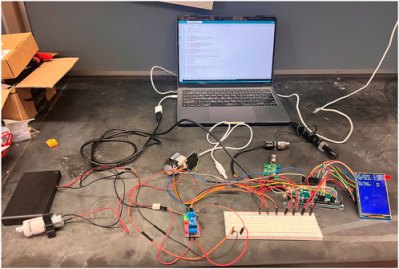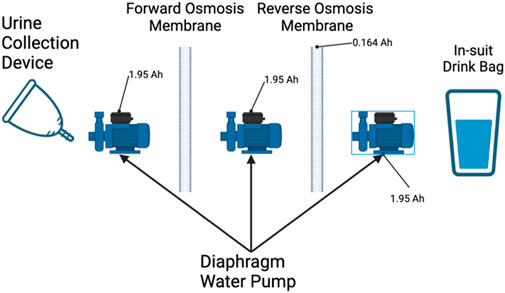An uncomfortable reality with the spacesuits used for extravehicular activities (EVA) – commonly referred to as spacewalks – is that the astronaut spends hours in them, during which normal bodily functions like urinating and defecating continue. The current EVA record at the ISS is currently a hair under nine hours, necessitating a new approach. A team of researchers have now pitched the idea of an in-suit water recovery system with an article by [Sofia Etlin] and colleagues as published in Frontiers in Space Technologies.
For the current Extravehicular Mobility Unit (EMU) EVA spacesuit the current solution is what is called the MAG: the Maximum Absorbency Garment, which is effectively a fancy adult diaper with sodium polyacrylate as absorbent for up to 2 L of fluids. It replaced the urine collection device (UCD) that was used until female astronauts joined the astronaut corps in the 1970s. Generally astronauts aim to not defecate until they finish their EVA, which leaves urinating and the related activity of rehydrating as the spacesuits only have 0.95 L of water that has to last the duration of the spacewalk.

By filtering the urine and recycling it into potable water, this should both prevent all the disadvantages of diapers and give astronauts much more water to drink during EVAs. Although the media reporting on this paper have often referenced the stillsuits of Dune, this device is significantly less advanced and quite bulky, with the filtration equipment contained in a backpack and would weigh about 8 kg. The waste water is filtered using a dual forward osmosis – reverse osmosis (FO-RO) system, with the FO used as a pre-filter to prevent membrane fouling common with RO.
Collecting the urine is performed by a UCD that is more reminiscent of pre-MAG systems, with a silicone cup that conforms to the genitals of the male or female astronaut. When urinating, the inner lining of the cup will detect the moisture and activate a vacuum pump to remove the urine and get it to the FO-RO system as quickly as possible. Filtered water would have salts added before being made available for consumption.
Of note is that this is decidedly still a prototype, but considering that similar technology is already used on the ISS to filter waste water, having a miniature version added to new (EVA) spacesuits seems only a matter of time. It should make hours-long trips strapped into a space capsule decidedly less unpleasant, too, beyond the obvious benefits to astronauts in the midst of an EVA.
















At first it looks like a lot of pieces but I suspect the same motor could run all 3 pumps.
Why not use a cartridge system instead? Store the fluids and provide a larger drinking water reserve within the suit. Upon return to habitation, remove the cartridge and recycle the water from it using a discrete system for that purpose. Simplifying the suit systems could be more hygienic and lighter weight with fewer points of failure that could interfere with an EVA.
Because that would limit the amount of urine that can be deposited while on EVA. This has the potential to work for longer uninterrupted sessions, as stated in the article.
> longer uninterrupted sessions
Currently they do 6 hrs EVA on average. Without food or breaks. Sounds good enough for me. Adding 1 or 2 liters of water sounds both simple and good enough. They’re not robots.
Yeah this just doesn’t seem necessary. A certain amount of space exploration is inevitably about recycling your habitat materials and drinking peepee, but this seems to be doing it just for the sake of doing it. Was Bill Gates involved by any chance? I hear he likes this stuff a lot
More like used water, but I suppose most water on Earth is used. It makes one wonder how Homeopathy works.
“And while it’s memory of a long lost drop of onion juice is Infinite/It somehow forgets all the poo it’s had in it! ” – Storm, Tim Minchin
8 kg is 8 liters of water. Increasing the current EMU water supply to more than eight times seems enough for any EVA without resorting to a recycling system. However, I suppose size is much more at a premium than weight in the EMU so the proposed recycling system must be much smaller than 8 L of water/urine storage in order to make sense. Also, there are surely ways to engineer in more lightness and smallness into the current prototype while there’s no way to reduce the weight and size of 8 L of water.
Although I suppose they could just dehydrate the water.
(/jk for the humor-impaired. :-) )
Weight matters a LOT when going up, but once in orbit, weight doesn’t matter at all (although mass inertia still makes moving hard). Volume would matter when moving through airlocks I suppose.
presumably the collected urine would be treated in the station instead of the suit after the EVA mission. 4 liters capacity for fresh water and urine each sounds enough.
You wouldn’t need 4 liters for each, if you use 2 bags in single compartment. There will never be 4 liters of urine and 4 liters of water in there at the same time; as the water is being consumed, it makes space for the urine, as one bag fills and the other is emptied.
I like two bladders being a simpler design than membranes and pumps. Might still need pumps in/out of the bladder because it’s in a weightless environment.
But then your drinking water sitting on one side of the bladder will turn body temperature as the other side fills.
A urethral catheter, and a colonic irrigation buttplug system. Maybe add a nasogastric feeding tube pumping soylent too. All you need is a networked Neurochip communication system and you can throw in a co2 blood scrubber/oxygenator system so you wouldnt even need lungs anymore. Think of the efficiency! Long term space travel sounds so fun!
“Man Plus” by Frederick Pohl for example?
When I grow up I don’t want to be an astronaut!
What is it about media on space exploration that makes people want to hyper-focus on the bathroom
Mark Watney would have reached the right orbit with this.
I want to hear more about what happens when they can’t stop themselves from defecating.
Now THAT’d be a hack.
No you don’t, it’s a real shit storm!
Spacesuits can be a real nightmare – see Lucas Parmitano on his second EVA :
“His second EVA on 16 July 2013 was terminated after only 1 hour and 32 minutes, when the helmet of his Extravehicular Mobility Unit suit started filling with water.[13][14] Water in his helmet posed the danger of drowning and made his return to the airlock even more difficult, as orbital sunset had occurred just before he started to return.[15] Engineers found that contamination had clogged one of the suit’s filters, causing water from the suit’s cooling system to back up.[16] On 15 January 2016, astronaut Timothy Kopra experienced a water leak in the same spacesuit.[17] Parmitano returned to Earth on 11 November 2013 aboard Soyuz TMA-09M.”
Astronaut Thomas Pesquet also experienced a significant sweating problem during his first EVA.
EVAs are known for being intensively physical and the problem of sweating is therefore a primary subject. There are often astronauts who sweat more profusely than average, but this also depends on physical exertion – they don’t go out into space to take selfies – even if they do after fullfilling their duties.
Apparently there is no sweat recovery system – if my knowledge is up to date. And yet the water eliminated by perspiration and breathing can be more significant than that eliminated by urine : I practice skiing intensively where cumulative downhill of 17,000 to 20,000m during the day are not uncommon and it is not unusual during a full day to not need to urinate at all between wake-up and when you come back home, although it is necessary to drink a lot during the day. In fact it’s like a situation of permanent dehydration : the body prevent water loss via urine.
Yeah, let’s see the stillsuit development progress
How are we just now attempting to modernize a space suit and remove the diaper? I did not have that on 2024 Bingo Card. Adult diapers no longer needed in space.
Yeah you still want something for number 2. For better or worse, diapers are a fairly optimal design and you will probably continue to see them far into the future.
Can’t they just piss into space through some kind of valve? The universe is your outhouse.
Watch out for orbital-velocity frozen piss crystals, it’s a highly embarrassing way to die. Kind of like that old urban legend about icy wee spears falling out of airplane toilets
Bear Grylls has been doing this for years.
Such a system could be useful in other situations as well such as a lifeboat. However, catheters likely wouldn’t be needed.
“urine and feces are processed in the thigh pads…..” – Liet Keynes (Dune)
This is the big inspiration I thought about, only didn’t remember the exact part of the book. Recycling in Fremen’s way. Mars is calling!
‘Salts added after filtration’ sounds a whole lot like “We couldn’t desalinate the pee” even with RHO
Ewwwwwww!
People who live in big cities should know that the tap water they drink has already been consumed several times…
That’s why I only drink
natural spring water.
If something breaks does the astronaut end up in a situation where urine is being fed into their mouth continuously until they can get back into the ship/station and out of the suit?